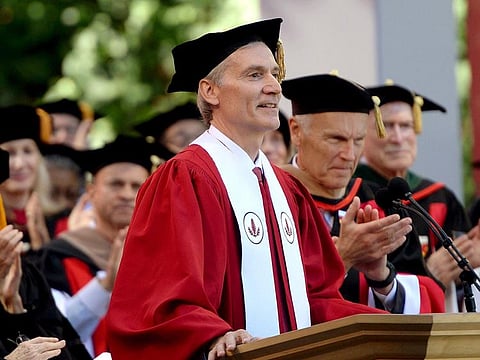How a student uncovered scandal that took down Stanford President Marc Tessier-Lavigne
Marc Tessier-Lavigne had one of the most stellar reputations in academia

A Rhodes Scholar who became a neuroscientist, Marc Tessier-Lavigne was credited with breakthrough research into the cause of Alzheimer's disease. His scientific work helped propel him to the position of president of Stanford University, where he excelled at raising money from Silicon Valley.
It took a now 18-year-old Stanford student, Theo Baker, writing for the campus newspaper, to highlight issues he'd skirted for decades. The articles, first reported in November, raised questions over the integrity of Tessier-Lavigne's research and his failure to address errors.
It was that refusal over two decades to "decisively and forthrightly" correct mistakes in the scientific record that ultimately helped bring down the president of one of the world's most respected research universities.
The resignation
On Wednesday, Tessier-Lavigne abruptly resigned after the university's board of trustees released a report confirming some of the allegations in the Stanford Daily. The report stopped short of agreeing with the newspaper's earlier allegations of potential research fraud.
"This shows that our reporting contributed to the correction of the scientific record for five widely-cited papers and I see that as a real indication of the power of independent student media to raise concerns to light," Baker said in a message over Twitter.
Tessier-Lavigne joined Stanford as president in 2016 from Rockefeller University in New York after decades as a leader in the field of brain and spinal cord research. His work has focused on the cause and treatment of degenerative diseases such as Alzheimer's and Parkinson's, as well as developing therapies for spinal cord injuries. Prior to Rockefeller he worked as chief scientific officer for Genentech Inc.
A successful fundraiser
Tessier-Lavigne was a highly successful fundraiser for the university, tapping Silicon Valley for mega-donations and outraising Harvard University in some years. He helped grow the university's endowment to more than $36 billion and aided the creation of the Stanford Doerr School of Sustainability, funded with a $1.1 billion gift from venture capitalist John Doerr in 2022.
But in a series of stories that began last year, the Stanford Daily detailed alleged incidents of research misconduct by Tessier-Lavigne. One focus was a 2009 Nature paper co-authored by Tessier-Lavigne that describes research directed at understanding the involvement of a certain protein that was theorized to be a driver of the disease.
At first, the research findings were widely hailed. But attempts to duplicate the experiments "- a key step in verifying seminal research" failed. The research was eventually found to be wrong. The student newspaper said that the research data had been manipulated, and that Tessier-Lavigne had resisted correcting it.
Genentech, where he worked when the paper was published, declined to comment on the findings, referring to a report it issued in April on Tessier-Lavigne's research. Genentech said then that a research committee's review "saw no allegations of fraud or wrongdoing."
The company acknowledged that "given that these events happened many years ago, our current records may not be complete."
In December, a special committee of Stanford's Board of Trustees, led by Stanford alumnus and Yahoo co-founder Jerry Yang, initiated a review into the allegations.
The report noted that Tessier-Lavigne hadn't followed up on unpublished corrections on two of his papers. In a message to the school community, he said he had tried to publish corrections in two journals where his research had appeared, but the publications had refused or failed to do so.
'More Diligent'
"I should have been more diligent when seeking corrections, and I regret that I was not," he wrote. "The panel's review also identified instances of manipulation of research data by others in my lab. Although I was unaware of these issues, I want to be clear that I take responsibility for the work of my lab members."
The university's board of trustees said Richard Saller, a Stanford classics professor, would become interim president in September and that Tessier-Lavigne's resignation will take effect at the end of August. He will remain on the faculty.
Saller, whose research interests are ancient history and classical archaeology, told Bloomberg that because it's an interim appointment, "it would be presumptuous to have grand plans."
"I intend to continue the work of Marc Tessier-Lavigne and several of his initiatives."
Baker, from Washington DC and the child of journalists, won the George Polk award in February as a college freshman. He continues to cover the fallout.
"Pushing for transparency in a place you love is the ultimate goal of student journalism and I really hope we've lived up to that," he said in a Twitter message.
Sign up for the Daily Briefing
Get the latest news and updates straight to your inbox



